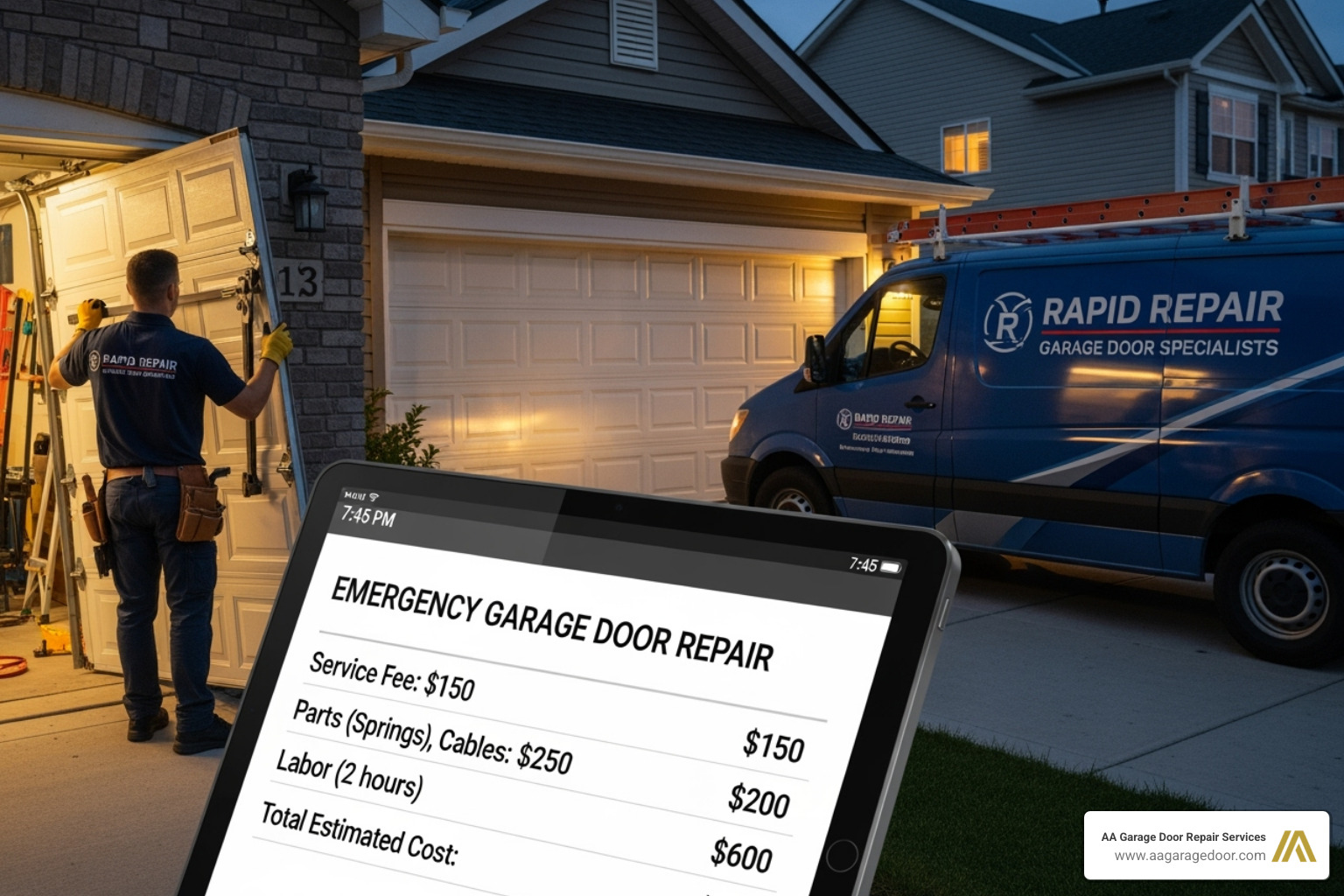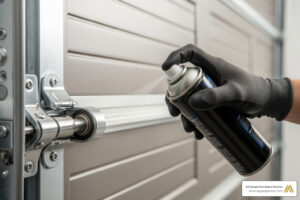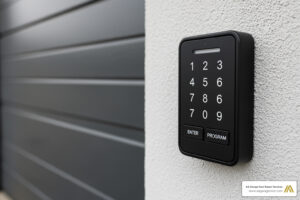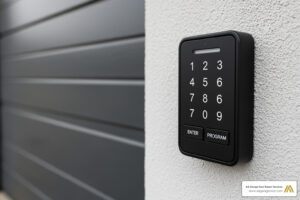Why Emergency Garage Door Repair Costs Matter
When your garage door fails, understanding the potential emergency garage door repair cost is crucial for making a quick, informed decision. A malfunctioning door is more than an inconvenience; it’s a security risk that requires immediate attention. For homeowners needing fast, reliable solutions, the Twin Cities garage door repair experts at AA Garage Door provide the expertise to resolve any issue. This guide breaks down every factor contributing to your final bill, helping you steer the expense without breaking the bank.
Emergency Garage Door Repair Cost Breakdown:
- Base repair cost: $155 – $378 (national average: $264)
- Emergency service premium: $100 – $300 additional
- Total emergency cost: $255 – $678 for most repairs
- Complex repairs: Can reach $700 – $800+
Emergency repairs typically cost 25-40% more than scheduled service calls due to after-hours rates and the need for an immediate response. The key to managing these unexpected expenses is understanding what drives the costs. For immediate assistance, our 24/7 emergency service offers transparent pricing and rapid response.
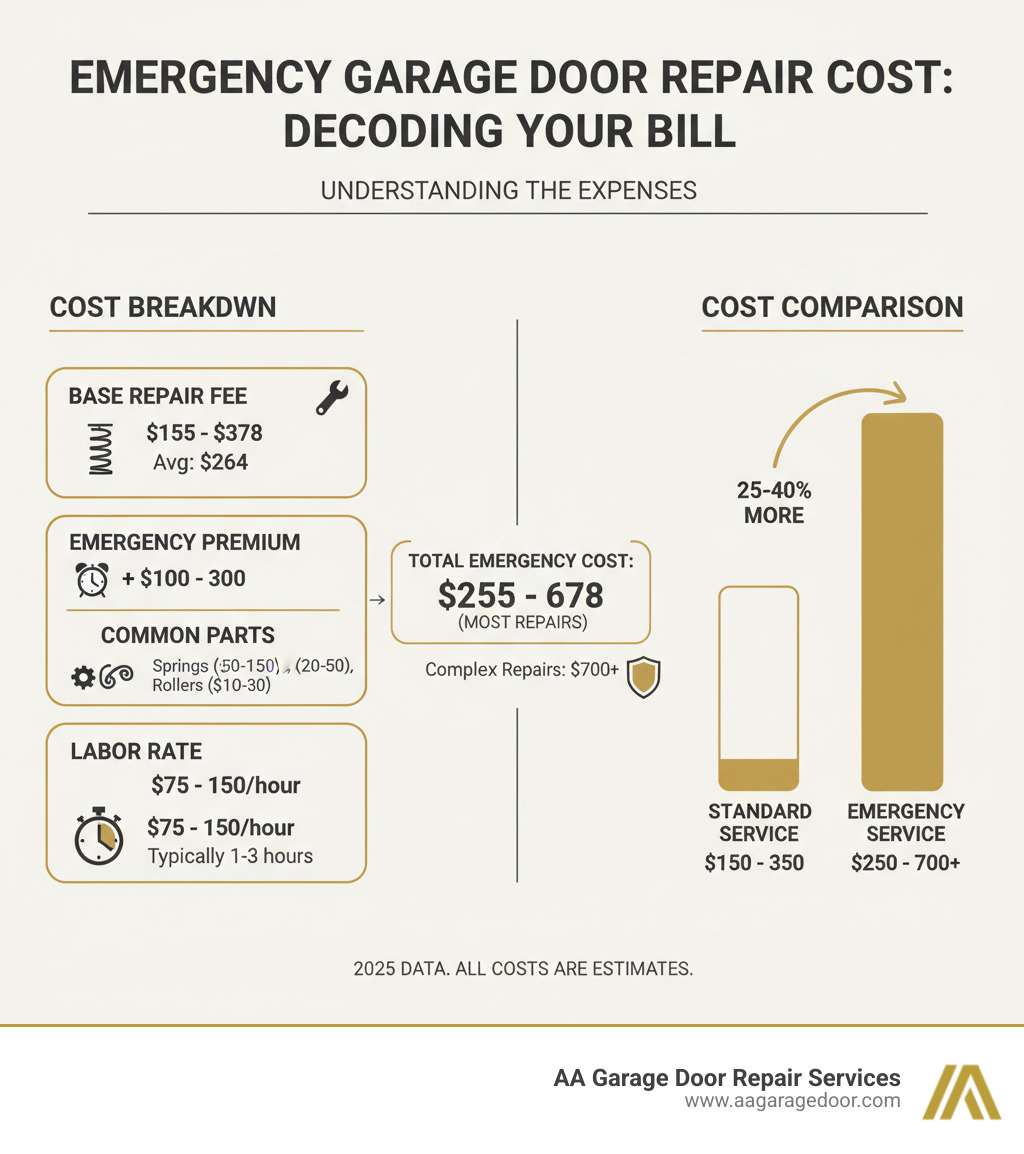
Emergency garage door repair cost helpful reading:
Understanding the Anatomy of Your Emergency Repair Bill
Your total emergency garage door repair cost is a sum of three distinct components: an emergency service premium, labor costs, and the price of parts and materials. Understanding each element helps clarify what can seem like a high bill during a stressful time.
A simple sensor adjustment will have a different cost structure than a full spring replacement, which involves significant labor and expensive components. Let’s break down each part of the bill.
The Emergency Service Premium
Garage doors often fail outside of standard business hours. The emergency service premium is an additional fee that covers the immediate dispatch of a technician during nights, weekends, or holidays. This premium ensures 24/7 availability for urgent security or access issues.
- Typical Premium: $100 to $300 on top of standard repair costs.
- Total Cost Increase: Emergency calls often cost 25% to 40% more than the same repair scheduled during regular business hours.
This fee allows us to maintain rapid response times and guarantee that help is available whenever you need it.
Labor Costs: The Price of Expertise
Labor is often the largest portion of the bill, accounting for 60% to 70% of the total. You are paying for a technician’s diagnostic expertise, specialized training for safe repairs, and a fully equipped service vehicle.
- Hourly Rate: $75 to $150 per hour.
- Typical Repair Time: 1 to 3 hours.
- Expected Labor Total: $150 to $450 for most emergency repairs.
Complex jobs, such as replacing a torsion spring system on a heavy door or working on older systems, naturally require more labor time.
Parts and Materials
The cost of replacement parts is the most variable factor. It depends entirely on what is broken, your door’s material, and the quality of the replacement parts.
- Minor Repairs: A faulty remote or damaged weather stripping may only cost $20 to $50 in parts.
- Major Failures: A broken torsion spring or burned-out opener motor can cost $200 to $400 in materials alone.
Door material also affects costs. Steel door parts are generally the most economical ($100-$350), while wood door repairs can be more expensive ($250-$1,000), especially for panel damage. We prioritize high-quality, durable parts to ensure a long-lasting repair.
Common Garage Door Emergencies and Their Estimated Costs
Over 23 years in the Twin Cities, we’ve seen every type of garage door failure. Understanding the most common issues and their estimated costs can help you make informed decisions during an emergency. These are general estimates; your specific situation can influence the final price.
Broken Garage Door Springs
Broken springs are the most common and dangerous emergency. The springs counterbalance the door’s weight, and when one snaps, the door becomes incredibly heavy and inoperable. This repair should always be handled by a professional due to the extreme tension involved.
- Torsion Springs: Mounted above the door, these cost $200 to $350 to replace.
- Extension Springs: Found on older doors along the tracks, these cost $150 to $280 to replace.
It is best practice to replace both springs at the same time, as they wear out at a similar rate.
Malfunctioning Garage Door Opener
The opener is the brain of the system. Problems can range from simple fixes to complete failure.
- Simple Fixes: Reprogramming remotes or realigning safety sensors typically costs $100 to $250.
- Motor or Gear Issues: If the motor runs but the door doesn’t move, repairs can range from $150 to $350.
- Circuit Board Failure: Replacing a faulty circuit board generally costs $125 to $200.
For openers over 10-15 years old, a full replacement (costing over $500) may offer better long-term value than repeated repairs.
Off-Track or Damaged Door
A door that has come off its tracks is a serious and dangerous issue, often caused by impact or broken components like cables or rollers.
- Track Alignment: Realigning bent or shifted tracks costs $125 to $150.
- Roller Replacement: Replacing a full set of worn-out rollers costs $110 to $230.
- Cable Repair: Frayed or snapped cables are a critical safety issue, with repairs costing $100 to $200.
- Panel Damage: Replacing a single damaged panel is the most variable cost, ranging from $250 to $1,000 depending on the door’s material and style. If multiple panels are damaged, replacement of the entire door may be more cost-effective.
Repair vs. Replace: Making the Right Call in an Emergency
During a garage door emergency, you face a critical decision: repair or replace? The right choice depends on the door’s age, the extent of the damage, and the long-term value of each option. Making a quick, confident decision is key.
When to Repair Your Garage Door
Repair is the most cost-effective solution for isolated issues on a door that is otherwise in good condition. Consider repairing in these situations:
- Minor Damage: The problem is limited to a single component, like a broken spring, a faulty sensor, or a single damaged panel.
- Younger Door: If your door is less than 10-15 years old, it likely has significant life left, making repairs a worthwhile investment.
- Cost-Effectiveness: A common rule of thumb is to repair if the cost is less than 50% of the price of a new door.
When to Opt for a Full Replacement
| Scenario | When Replacement Makes Sense | Key Warning Signs |
|---|---|---|
| Multiple Damaged Panels | When more than two panels need replacement, the cost often approaches that of a new door. | Extensive denting, cracking, or warping across multiple sections. |
| Obsolete Parts | Older doors may require parts that are no longer manufactured or are prohibitively expensive. | Long wait times for parts; inability to find compatible components. |
| Severe Structural Damage | The door frame is compromised, making repairs unsafe and ineffective. | The door sags, fails to seal properly, or has major gaps around the edges. |
| Advanced Age | Doors approaching their 15-30 year average lifespan require a major repair. | Frequent breakdowns; multiple systems failing at once. |
If your door is nearing the end of its average 15 to 30-year lifespan (see industry benchmark from Angi) and needs a major repair, a full replacement often provides better value and reliability than continuing to patch an aging system. An experienced technician can help you evaluate your specific situation to make the best choice.
How to Manage and Prevent High Emergency Garage Door Repair Costs
While some garage door emergencies are unavoidable, proactive measures can prevent many issues and reduce the emergency garage door repair cost when they do happen. A small investment in maintenance now can save you from a much larger, unexpected bill later.
The Power of Preventative Maintenance
Regular maintenance is the most effective way to prevent breakdowns. An annual professional inspection can prevent 60-70% of emergency calls by catching minor issues before they escalate. This is a key part of any essential guide to garage door repair.
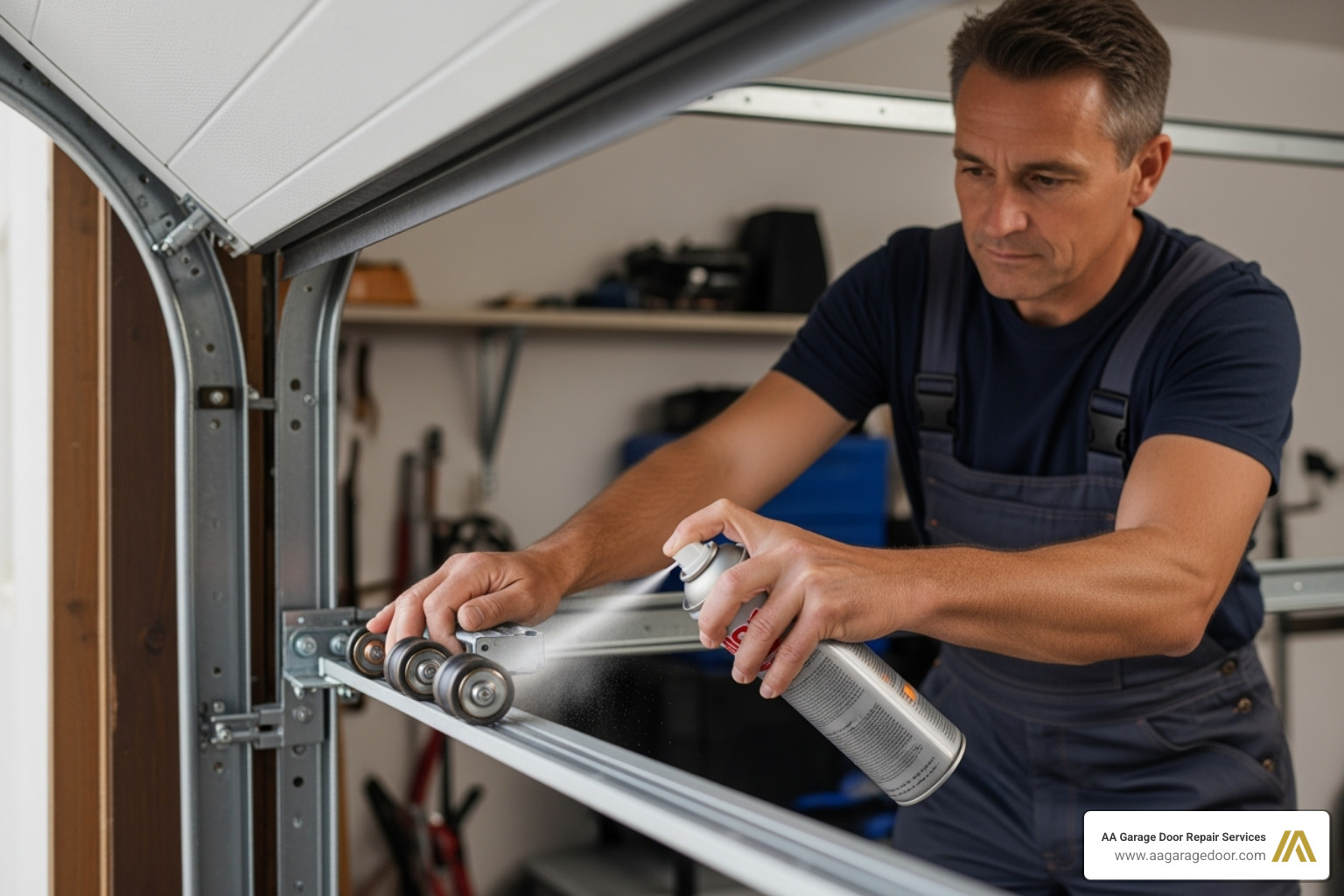
In between professional tune-ups, you can perform simple DIY checks:
- Lubrication: Annually apply a silicone-based lubricant to rollers, hinges, and springs.
- Sensor Cleaning: Wipe the photo-eye sensors with a soft cloth to prevent alignment faults.
- Visual Inspection: Look for frayed cables, rust, or worn rollers every few months.
- Balance Test: Disconnect the opener and lift the door halfway. If it doesn’t stay put, the springs need professional adjustment.
Tips for Reducing Your Emergency Repair Bill
If an emergency occurs, these strategies can help manage the cost:
- Ask for Off-Peak Discounts: If the situation is not a critical security risk, scheduling service during a less busy time may reduce the cost by 5-15%.
- Get Multiple Quotes: When time allows, comparing quotes from reputable providers can ensure fair pricing.
- Check Warranties: Your door or its components may be under a manufacturer or service warranty, which could significantly lower your out-of-pocket cost.
- Inquire About Package Deals: If multiple parts are failing, ask about bundled pricing for addressing all issues in one visit.
- Review Insurance Coverage: Homeowner’s insurance may cover damage from accidents, storms, or vandalism. Document the damage and check your policy.
Frequently Asked Questions about Emergency Garage Door Repair Costs
When facing a garage door emergency, you likely have urgent questions. Here are direct answers to the most common concerns about emergency garage door repair cost and service.
What is the average response time for an emergency garage door service?
Most professional companies offer 24/7 same-day service, with technicians often dispatched within a few hours of your call. In primary service areas like Minneapolis, response times can be even faster. The primary goal is to address the security vulnerability and restore access to your home as quickly as possible, regardless of the time or day.
Is it cheaper to call for an emergency repair on a weekday versus a weekend?
Yes, it is significantly cheaper. Emergency services on weekends, holidays, or overnight can cost 25% to 50% more than the same repair during standard weekday business hours. This is due to the emergency premium charged for after-hours labor. If your issue is not an immediate security risk, waiting until the next business day can save you money.
Can I repair a broken garage door spring myself to save money?
No. You should never attempt to repair or replace garage door springs yourself. The springs are under hundreds of pounds of tension and can cause severe injury or death if they release unexpectedly. The National Safety Council identifies DIY garage door spring repair as a leading cause of serious home-related injuries. The professional repair cost of $180 to $350 is a small price to pay for your safety and to ensure the job is done correctly.
Secure Your Home with a Trusted Professional
Understanding the components of an emergency garage door repair cost empowers you to make confident decisions under pressure. A functioning garage door is essential for your home’s security, and when it fails, a professional and lasting repair is non-negotiable.
The best way to manage costs and ensure safety is to partner with a trusted professional who values transparency. While preventative maintenance is the best way to avoid emergencies, having a reliable team on call is crucial for when the unexpected happens.
Since 2001, AA Garage Door Repair has provided Twin Cities and Western Wisconsin families with honest pricing, rapid response, and guaranteed work. We are here to get your life back on track without breaking your budget.
Ready to solve your garage door emergency? Schedule your Emergency Garage Door Repair online for immediate, professional assistance. When your garage door fails, you shouldn’t have to wait.

